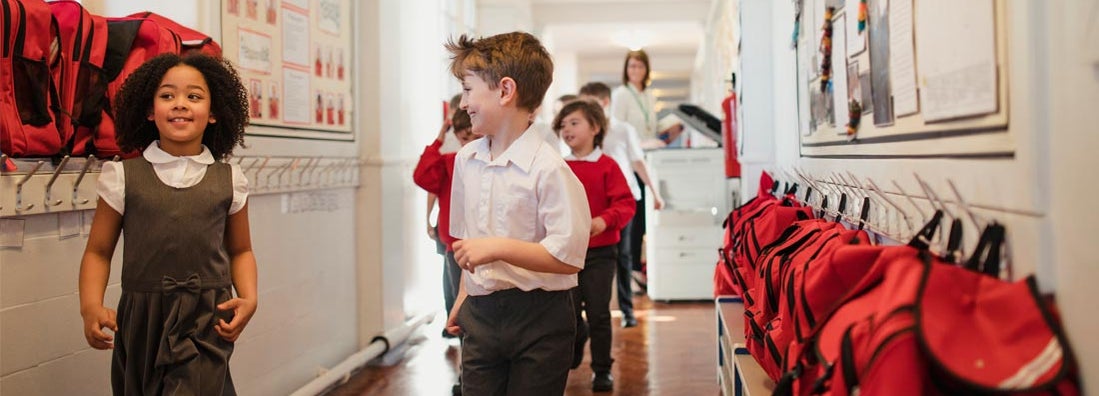
Here's how to protect your private school from catastrophe.

Written by Maggie Tiede

Maggie Tiede is a writer and blogger based in Saint Paul, Minnesota. Maggie has worked as a freelance writer since 2013, when she began reporting on politics, local events, health, and human interest for the Grand Rapids Herald-Review.
Reviewed by Paul Martin
Paul Martin is the Director of Education and Development for Myron Steves, one of the largest, most respected insurance wholesalers in the southern U.S.
Updated сентября 6, 2024 
Save on Business Insurance
Our independent agents shop around to find you the best coverage.
4.7 million K-12 students were enrolled in private schools in the U.S. in 2021.
Private and charter schools allow students to experience elite academics, arts and technical training, and religious education that public schools can’t, which might be why 59% of Americans agree that they usually provide a better education than public schools.
There’s never been a better time to start a private school. If you or your organization are thinking about taking the plunge, or if you're looking to upgrade your coverage, we’ve got the private school insurance guide you need.
You don’t even need to do the hard parts yourself. Our independent insurance agents can shop for you to find the right coverage at a great price.
Save on Business Insurance
Our independent agents shop around to find you the best coverage.
Even for nonprofit schools, private school insurance is almost identical to business insurance. It’s usually a blend of these five parts:
There are a few other important types of insurance to consider. One is directors and officers insurance, which will pay legal costs for your board of directors and leadership in case of a serious gaffe that leads to a lawsuit.
Cyber liability insurance protects your organization’s digital data. Finally, employment practices insurance covers you if you’re accused of unfair or discriminatory hiring practices.
The difference between private school insurance and business insurance is scale. When kids’ lives are at stake, the cost of a tragedy is going to be way higher than it might be at your typical restaurant or retail store.
That means you’ll need to pay for more coverage. Think millions of dollars instead of hundreds of thousands. (Your coverage amount is the maximum amount of money your insurance company will pay out if you file a claim.)
This is why umbrella insurance is a must-have for private schools. The commercial auto insurance that covers your school buses may only offer a few million dollars in coverage, but if a tragic accident leaves your school facing a big lawsuit, the settlement reached could cost many times more than that.
Umbrella insurance covers this gap, so you don’t have to pay the difference. It’s a cost-effective way to manage risk since buying an umbrella policy is cheaper than buying extra coverage on your policies individually.
Private school insurance works much the same way for all types of private schools, whether they’re religious, secular, or chartered. Let’s break down a few key differences:
Insurance for secular private schools is usually the most basic type of private school insurance, depending on the school’s size and what types of programs it offers. (The more students and staff, the more complex the insurance.)
Arts schools and technical schools may have special insurance needs if they expose students and staff to flammable or dangerous equipment and materials, such as paint or saws.
3.7 million students attended religious private schools in 2021, with 1.7 million of those students attending Catholic schools. Religious affiliation provides plenty of benefits to private schools, namely a built-in student base and extra space for classrooms and special events.
If your religious school shares a campus with your church or other place of worship, you may be able to combine commercial property insurance and save money. Just be sure that each entity’s financial responsibilities are clearly spelled out to avoid conflict.
Extra liability insurance may also buy a religious private school some peace of mind, given the extra media attention and polarizing legal situations that can develop during scandals at this type of school.
Charter schools work a little differently from other private schools since they usually receive public funds and may function as part of the public school system. They may face additional regulations, depending on your state.
Because charter schools are held to an extremely public standard of leadership — outlined in their charter — directors and officers insurance is especially important. For online charter schools, cyber liability insurance is a must since you’re responsible for extra student data that’s vulnerable to hackers.
Similar to secular private schools that offer special technical programs for students, arts- or technical-focused charter schools may have additional property and liability insurance needs.
Save on Business Insurance
Our independent agents shop around to find you the best coverage.
In short, because kids are risky. Parents trust you not only to keep their children safe but also to adequately prepare them for adult life. That’s a big responsibility, and there are lots of legal risks that result from that.
A teacher harming a student, an inadequate curriculum, or faulty safety equipment could all lead to massively expensive lawsuits — so expensive you probably wouldn’t be able to keep your doors open if you didn’t have insurance.
There’s also the sticky matter of statutes of limitations. For adults, these statutes start ticking as soon as something bad happens. In Alabama, an adult has two years to file a personal injury lawsuit from the date of the injury. If you don’t file within that time, you don’t get to sue at all.
For kids, however, these statutes often don’t take effect until their 18th birthday. That means if a child gets injured at school in kindergarten, they (and their parents) have an extra 13 years to sue. That’s a massive risk for schools and one that private school insurance is designed to cover.
Moving on to the adults, hiring teachers and other staff makes you financially responsible for their retirement plans and benefits, as well as any injuries that happen on the job.
If you mismanage a 401(k) fund, directors and officers insurance can kick in and help you make your employees whole. If your gym teacher throws out their back, workers' compensation shields you from paying expensive medical bills.
Then there’s your school’s belongings. If your building burns down or gets damaged in a natural disaster, commercial property insurance helps pay for repairs. If equipment gets stolen, insurance pays for that, too.
Private school insurance also usually has special provisions for the lost income that might result if your building is damaged in the middle of the school year and students go elsewhere for the remainder of the semester.
Commercial auto insurance is especially critical for private schools that own vehicles. Think of everything that could go wrong on a school bus, or what could happen if a maintenance vehicle collided with a student.
Commercial auto insurance covers every vehicle owned by your organization.
An accident involving these vehicles is far more expensive than your average car crash, and this type of auto insurance protects you from that cost.
Plus, if you’re planning to apply for loans in order to fund the school, your lender will almost certainly require you to buy insurance. They’ll want to make sure you’ll be able to keep up your payments, even in the middle of a crisis.
On the low end, you should expect private school insurance to cost a few thousand dollars per month in premiums. Large private schools will cost much more.
Factors that affect cost include the size of your school (both your campus and the number of students), the number and training of your teachers, the age of your students (younger students often cost more to insure), whether you operate buses, and whether your school offers athletics and special programs.
The best way to save money on private school insurance is to follow the law — and common-sense safety procedures — as closely as possible. Insurance discounts don’t usually work like 10% off coupons.
They’re all about lowering risk since the lower the risk of filing a claim, the lower the risk of the insurance company needing to pay out. They’ll pass those savings on to you, and you may not even realize you’re getting them.
Let’s talk about examples of private school insurance discounts:
There are more ways to save money on private school insurance since private schools juggle hundreds of risks. Your independent insurance agent can help you find more.
Save on Business Insurance
Our independent agents shop around to find you the best coverage.
Private school insurance is tricky, and only a few insurance companies offer it. Fortunately, you can reach out to an independent insurance agent instead, and they’ll do all the work of rounding up quotes and comparing coverage types for you.
An independent insurance agent is your advocate. They’re not bound to any one insurance company, so they can help you choose the true right coverage for you — not just the quote one company is offering.
You should ideally look for an agent who has experience insuring private schools. At a minimum, they should have an established relationship with an insurance company that offers a private school insurance program.
Don’t be afraid to ask your agent about their experience. If you’re not convinced that they’ve got the know-how you need, you can ask them to refer you to a colleague who does.
It’s worth noting that if you hire teachers who belong to a state or regional teachers’ association, you might already have some liability coverage. Many associations and unions buy bulk liability policies for their members as part of their dues, meaning if a teacher gets named in a lawsuit, they’ll already have help with their legal costs.
Your school needs to have its own liability insurance, too, but if you’re strapped for cash, this helps lower the amount of liability coverage you’ll need to buy.
Here are a few questions to ask yourself before talking to an independent insurance agent about private school insurance:
Even if you don’t have all the answers right now, your independent agent can help you get the ball rolling. They’ll start putting together quotes that you can compare to find the right types of coverage, amount of coverage, and price.